#melodrama world tour
Explore tagged Tumblr posts
Text
No bc nobody talked about this enough
youtube
There is hardly a peep from the audience at times
Captivatingly done
#lorde#pure heroine#melodrama#melodrama world tour#lorde melodrama#lorde music#lordemusic#solar power#solar power world tour#lorde solar power#lorde pure heroine#400 lux#bruce springsteen#Bruce Springsteen cover#lorde lyrics#lorde concert#Youtube
2 notes
·
View notes
Text

🌠 Let's Go to Perfect Places 🌠
#coloring based off Lorde's melodrama album#broppy#poppy#branch#trolls#trolls world tour#trolls band together#dreamworks trolls#dreamworks
79 notes
·
View notes
Text
Gravity Falls fic rec list...Part 2.
I should be grading writing right now, but in the spirit of procrastination, I'm going to instead post about my favorite new fics that have emerged in the post-Book of Bill era.
~~~~~~
Gen Fics
A Mariner’s Guide to the Unexplained by mariezies
Another fic that tackles the idea of Stan's criminal past coming back to haunt him as the elder Pines twins take to the sea. What I really like about this fic are Ford's inner monologues and in particular, the way he overthinks his interactions with his brother post-Weirdmaggedon due to the crushing level of guilt he feels. Bonus points for the incredibly adorable cat OC who joins the twins on the Stan o'War II. Incomplete.
We're Still Here by Simplistic_Apricity
What if Stan hadn't knocked Ford through the portal in 1982 and stuck around Gravity Falls instead? A bajillion fics have been written about this concept, but this one takes a slightly different approach as to the fallout from a Bill-possessed Ford attacking his brother as Ford slowly (slowly) comes to terms with what exactly he has wrought in that basement. The characterization and interactions of the twins and Fiddleford are incredibly grounded, avoiding melodrama while still being wildly effective. Incomplete. TWs for violence and medical trauma.
~~~~~~
Billford Fics
Not to sound like a 2013 hipster, but I do want to state that I hopped on this seafaring vessel pre-BoB and am delighted to witness the explosion of works exploring the demented, tortured relationship between these two absolute disasters. I've decided to let my cringe flag fly high and free here, with the caveat that I only indulge in triangle!Bill stories (accept no substitutions), as, let's face it, Ford is a freak (affectionate) and he loves his geometry.
Statement Abnegation by Anonymous
This one probably needs no introduction, but I'd be wholly remiss if I didn't include it on my list. A+ characterization of both Ford and Bill and it fucking nails the landing. Ford is taken prisoner during Weirdmaggedon, but this time Bill's playing for keeps. Complete. TWs for torture, death (temporary), Stockholm syndrome, and explicit sexual content.
apology tour by dolorous
There's something downright wistful about this story, which presents as "crack taken seriously" when Bill chooses Ford to be his keeper/chaperone as part of a Theraprism-mandated apology tour to those he has wronged post-BoB. Ford hates Bill. Ford sometimes doesn't hate Bill. Ford definitely hates Bill. And now they're stuck on the road trip from hell. Complete. Implied past (current/future?) relationship, no sexual content.
Then it becomes, it becomes, it becomes a problem by tempusedaxrerum
Takes place post-Betrayal but (so far) pre-Stanley arriving in Gravity Falls. Bill is determined to drag Ford into opening the Portal, kicking and screaming (limbs optional). Features an incredibly well-developed OC who is battling demons of her own when she has the misfortune of crossing paths with both Bill and Ford on a snowy evening in Oregon. Incomplete. TWs for violence, attempted sexual assault via possession, substance abuse.
Live, Laugh, Lather, Rinse, Repeat by ShibaIntuit
The conceit of this story is absolutely wild. Essentially, Ford eats a cursed piece of pizza and suffers from existential indigestion. The world-building once Ford is in the multiverse is delightful as an older Ford tries to renegotiate his past with a Bill Cipher of thirty years previous. Incomplete. TWs for violence.
as falls gravity so falls gravity falls by underwater_owl
A series of three stories that take a deep dive into Ford's subconscious while exploring the idea of the Axolotl placing Bill under Ford's mental power due to shenanigans you are better off reading about than me explaining here. Bait & Switch is the main narrative, which is a gen work featuring the whole extended Pines family plus Mabel and Dipper's mother, while Because & Despite and Cause & Effect explore the intense psychosexual relationship between Ford and Bill before and during the events of Bait & Switch. These last two stories really dig into the nature of Ford's deepest and darkest desires and the utterly twisted relationship between Ford and Bill. Incomplete. TWs for explicit sexual content (read the tags on those two last stories, folks! This author isn't, or is, I suppose, fucking around).
Snakes in the Garden by Miss_Ginger_Bread
Another Jimmy Snakes story! Because both Pines twins have terrible taste in men/demonic entities. A ghost from Stan's past shows up in Norway, prompting Ford to take matters into his own hands. Lovely interactions between the Pines twins, including a murderous, protective Ford and a Ford who is harboring a gigantic, triangle-shaped secret from his brother. Incomplete. TWs for abusive relationships.
#hello there#gravity falls#fic recs#okay now i'm going to work on *my* gf story#write write write!#stanford pines#bill cipher#stanley pines#billford
143 notes
·
View notes
Text
Interview with the Los Angeles Times (2024)

“This is where all the cruising happened.”
Jonathan Bailey and I are standing in Pershing Square on a bright, blustery spring afternoon, nearing the end of a homemade queer history tour of downtown L.A.: One Magazine, Cooper Do-Nuts/Nancy Valverde Square, the Dover bathhouse, the Biltmore Hotel and this, the city’s former Central Park, a haven, since before World War I, for “fairies” and “sissy boys,” servicemen on leave and beatniks on the road.
“Is it still happening now?” he asks.
“Probably not as much,” I venture.
“Well, you let me know if it’s happening,” he teases, a mischievous smile lighting up his face.
Bailey understands the uses of the charm offensive. As Sam, the handsome Lothario of Phoebe Waller-Bridge’s delightful pre-”Fleabag” curio, “Crashing”; Anthony, the romantic hero of “Bridgerton’s” second season; and John, the jerk of a protagonist in Mike Bartlett’s love triangle play “Cock,” the English actor, 36, has swaggered up to the precipice of superstardom. With roles in such studio tentpoles as “Wicked” and “Jurassic World” on the horizon, he may just break through. Yet he delivers career-best work in Showtime’s queer melodrama “Fellow Travelers,” as anti-Communist crusader-turned-gay rights activist Tim Laughlin, by leaving behind the self-assured rakes and tapping a new wellspring: soft power.
Tim may be, as Bailey puts it, “an open nerve,” but as it turns out, the devout Catholic and political naïf — who falls for suave State Department operative Hawkins “Hawk” Fuller (Matt Bomer) just as Sen. Joseph McCarthy tries to purge the federal government of LGBTQ people — is formidable indeed.
Stretching from the Lavender Scare to the depths of the AIDS crisis, in scenes of tenderness, cruelty and toe-curling sex, Bailey’s performance communicates that little-spoken truth of relationships: It takes more strength to submit than it does to control. The former demands discipline, courage, trust; the latter requires only force.
“In ‘Bridgerton,’ [Bailey] is like a Hawkins Fuller character — he is very sexy and has lots of power, has that kind of confident charisma that absolutely is not Tim at all,” says “Fellow Travelers” creator Ron Nyswaner.
But any doubt about Bailey’s ability to mesh with Bomer, who boarded the project early in development, was put to bed with the actors’ virtual rehearsal of a meeting on a park bench in the pilot. “‘Well, that’s a first,’” Nyswaner recalls an executive texting him. “I cried in a chemistry read.”
‘Am I inviting people in?’
Bailey grew up in a musical family in the Oxfordshire countryside outside London, and this, coupled with an appreciation for the morning prayers, choir practice and Mass he attended as a scholarship student at the local Catholic school, fed his precocious talents. (“I loved the performance of it,” he laughs. “Not to diminish the celebration of religious process, but I did love the idea of wearing a gown.”) By age 10, he’d appeared in the West End, playing Gavroche in a production of “Les Misérables,” an experience he now recognizes as an encounter with a queer found family — albeit one shadowed by the toll of the AIDS crisis, which peaked in the U.K. in the mid-1990s.
“When I’m asked about my childhood, there’s so much I don’t remember, and I think that’s true of anyone who’s been in fight or flight for 20 years,” he says. “I would have been in a cast of people whose friends would have died in the last seven years. I think of where I was seven years ago. I had all my gay friends then. It’s only retrospectively that I can retrofit a real gay community around me [in the theater], that I just wasn’t aware of [then].”
During the late 1990s and early 2000s, American and British culture presented queer adolescents with a bewildering array of mixed signals. As beloved celebrities came out in growing numbers, and the battle for marriage equality became a central locus of LGBTQ political organizing, the media continued to propagate harmful stereotypes of gay men as miserable, lonely, perverted or worse — and, Bailey remembers, callously turned George Michael, arrested on suspicion of cruising in a Beverly Hills restroom in 1998, and Irish pop star Stephen Gately, who revealed his sexuality in 1999, fearful he was about to be outed, into tabloid spectacles.
No wonder Bailey, like many LGBTQ people of his generation, should feel the “chemical” thrill of “validation and acceptance” during London Pride at age 18, then embark on a two-year relationship with a woman in his 20s.
“Dangerously, if you’re not exposed to people who can show you other examples of happiness, you think that’s the easiest way to live,” Bailey says. “It’s funny. You look back and you can tell the story in one way, which is that I always knew who I was and my sexuality and my identity within that. But obviously at times, it was really tough. I compromised my own happiness, for sure. And compromised other people’s happiness.”
Disclosures about his personal life have become particularly thorny for the actor since the premiere of “Bridgerton,” the blockbuster bodice-ripper from executive producer Shonda Rhimes.
“The Netflix effect does knock you off center completely,” he says, recalling the experience of finding a paparazzo waiting outside his new flat before he’d even moved in. “Suddenly, you do start having nightmares about people climbing in your windows... Even now, talking about it makes me feel like, ‘Am I inviting people in?’”
He is also critical of the media for churning out headlines about the smallest details of celebrities’ private lives, often detached from their original context. In an interview with the London Evening Standard published in December, Bailey described a harrowing encounter in a Washington, D.C., coffee shop in which a man threatened his life for being queer — and, in recounting the experience, offhandedly mentioned the “lovely man” he’d called, shaken, after it happened. Although Bailey acknowledges that the original story handled the subject with aplomb, he felt dismayed that more attention wasn’t paid to the intended warning about rising anti-LGBTQ sentiment: “The only thing that got syndicated from that story was that I had a boyfriend, and it wasn’t true,” he sighs. “It was kind of depressing, if I’m honest.”
Still, Bailey, who once turned down a role in a queer-themed TV series because it would have required him to speed along revelations about his personal life he wasn’t ready to make, is prepared to embrace the power of vulnerability when it feeds the work. Although a member of his inner circle expressed doubts about “Fellow Travelers’” steamy sex scenes, for instance, the actor intuited that they were what made the project worth doing: “I was like, ‘I’m telling you, they are the reason why this is going to be brilliant.’”
‘He’s changed my trajectory in my own life’
To those who would complain about the state of sex in film and TV, “Fellow Travelers” is the perfect riposte. All of it matters, from Tim’s first flirtation with Hawk to the finale’s closing minutes, because the series, at its core, is about the importance of soft power: the strength required to bend, but not break; to adapt, but not abandon oneself; to survive without shrinking to nothing in the process.And depicting that through sex, specifically gay sex, makes “Fellow Travelers” radical indeed.
Bailey understands that baring so much comes with certain risks. When I tell him that research for the story has filled my algorithmic “For You” feed on X (formerly Twitter) with speculation that his onscreen relationship with Bomer has a real-life element, he notes that “shipping” fictional couples and costars alike has long been part of Hollywood fantasy. But he bristles at the implication that he and Bomer are anything but skilled actors at work.
“I would love for people to know that the success of our chemistry isn’t based on us f—. It’s actually about us leaning into the craft,” he says. “It’s a vulnerable situation to be in, talking about it on record. I don’t want to rob people of their thoughts. But I do have a set of values, and as an artist, you don’t need to be f— to tell that love story.”
Underlying that craft, Bailey adds, is the confidence to speak up, as with one scene in “Fellow Travelers” that was adjusted because he said, “I don’t want to be naked today.” He learned to use his voice the hard way: In his early 20s, he recalls, he was once “bullied” on set when “someone was threatened” by him and vowed to himself, “I’m never going to do that to someone. I’m never going to allow that to happen.”
This impulse to direct his influence in support of others has blossomed further with “Fellow Travelers.” On the day of our interview, Bailey enthuses about an upcoming meeting with legendary gay rights activist Cleve Jones and shares his idea for a docuseries recording the stories of elders in the LGBTQ+ community while they are still here to tell them. He describes lying in a hospital bed on set on World AIDS Day, in character as Tim, surrounded by gay men who had lost friends and lovers during the crisis, and finding himself thinking, “What do I want to leave behind?”
“I think he’s changed my trajectory in my own life,” Bailey says.
This is, perhaps, the most common reaction I know to diving deep into queer history — the understanding that we, like our forerunners, are responsible for shaping the queer future, whether in politics, society or art. No one is going to do it on our behalf.
As we stand on the nondescript corner now named for her, I relate the story of the late queer activist Nancy Valverde, who was arrested repeatedly while a barber school student in the 1950s on suspicion of “masquerading” because of her preference for short hair and men’s clothing, and later successfully challenged her harassment by the police in court.
“What a hero!” Bailey exclaims, wondering at Valverde’s bravery. “The thing that’s so interesting with power battles is, ultimately, identity is the thing that gives you the most strength and power in your life, isn’t it?
“Because that’s one thing people can’t take away from you: who you are and how you express yourself.”
Source
#jonathan bailey#jonny bailey#interviews#interviews:2024#LA times interview 2024#LA times#fellow travelers#NEW!
79 notes
·
View notes
Text

In the childhood memories of more than one generation, Glynis Johns, who has died aged 100, will be best remembered as the Edwardian materfamilias of the hugely popular Walt Disney musical Mary Poppins (1964). Winifred Banks, married to David Tomlinson’s George W Banks, is the mother of Jane and Michael, the children in the care of the magical nanny played by Julie Andrews. A protester for the right to vote, Winifred delivers a spirited rendition of the song Sister Suffragette – “Our daughters’ daughters will adore us. And they’ll sing in grateful chorus: ‘Well done, Sister Suffragette!’” – as the children’s previous nanny tries to quit.
But the husky-voiced actor had other claims to fame from her more than 60 films and 30 stage productions. In 1973, Stephen Sondheim composed the song Send in the Clowns for Johns when she was cast in the leading role of the premiere production of his musical A Little Night Music, on Broadway. And she had won initial stardom in the British cinema as a mermaid.
In the title role of the film comedy Miranda (1948), she travels from Cornwall to London and causes romantic complications among the Chelsea set. Although the film’s whimsy may now seem strained, it was a great commercial success in its day, making Johns a top-liner in British movies. Miranda returned in a rather belated sequel, Mad About Men (1954).
By that time, Johns had moved almost completely from stage to films, where she was associated chiefly with lightweight roles, alternately fluffy and feisty. One of her most appealing opportunities came in the thriller State Secret (1950, released as The Great Manhunt in the US), playing a cabaret artiste in a fictitious Balkan country, and gamely singing Paper Doll in a wholly invented language.
It says something for her properties of youthfulness that at the age of 30 she could play a teenage schoolgirl in the melodrama Personal Affair (1953). The same year she played in two fanciful Walt Disney British productions, as Mary Tudor in The Sword and the Rose, and as the heroine wife of Rob Roy, and she went on to make her first Hollywood picture, the Danny Kaye comedy The Court Jester, in 1955. The following year she played a cameo role in the star-studded Around the World in 80 Days.
At the time Johns alternated between American and British films, generally in subordinate roles, but a rewarding one came in The Sundowners (1960), set in Australia, as a jolly barmaid who takes a shine to a visiting Englishman played by Peter Ustinov. It brought her an Oscar nomination as best supporting actress. Top billing came in a stylish horror movie, The Cabinet of Caligari (1962). She was well enough known to American audiences by this time to star in 1963 in Glynis, a TV sitcom series that ran for just one season.
In 1966 Johns returned to the London stage in The King’s Mare, as Anne of Cleves to Keith Michell’s Henry VIII. Her Welsh heritage came into play when she took the role of Myfanwy Price in a screen version of Dylan Thomas’s Under Milk Wood (1971) starring Richard Burton, Elizabeth Taylor and Peter O’Toole, and two years later came her great Broadway success as Desiree Armfeldt in A Little Night Music, which brought her a Tony award.
Glynis came from a show business background: her mother, Alice Steele (nee Wareham), was a concert pianist who performed under the name Alys Steele-Payne, and her father was the prolific character actor Mervyn Johns. He was a stalwart in particular of Ealing Studios films: father and daughter appeared together in an Ealing drama, The Halfway House (1944).
Though her vocal intonations pointed to her Welshness, Glynis was born in Pretoria, South Africa, where her parents were on tour. She was reportedly carried on to the stage at the age of three weeks, and it was not too much longer before she was appearing there in a professional capacity, making her performing debut at the Garrick theatre, London, as a dancer in a revue called Buckie’s Bears (1935).
Educated at Clifton high school, Bristol, and South Hampstead high school and the Cone School of Dancing in London, she rapidly graduated to juvenile acting roles in both theatre and cinema. Her first screen appearance came at the age of 14, as politician Ralph Richardson’s troublesome daughter in South Riding (1938), and on stage she was the young sister, another Miranda, in Esther McCracken’s comedies Quiet Wedding (1938) and Quiet Weekend (1941).
That year brought the opportunity to appear in the film 49th Parallel, starring Leslie Howard and Laurence Olivier in a spy thriller intended to bolster second world war support in the US. When the prospect of playing a mermaid came after the war, she was able to draw on her theatrical versatility: “I was quite an athlete, my muscles were strong from dancing, so the tail was just fine. I swam like a porpoise.”
Johns returned to the London stage in 1977, as Terence Rattigan’s choice to play the murderer Alma Rattenbury in his well-received dramatisation of the Rattenbury case, Cause Célèbre. Her acting appearances became sporadic, though in 1989 she starred with Rex Harrison and Stewart Granger on Broadway in Somerset Maugham’s The Circle.
She was occasionally a guest star in US television series such as Murder She Wrote and The Love Boat, and played Diane’s rich mother, Helen Chambers, in the first series of Cheers (1983) and Trudie Pepper in the sitcom Coming of Age (1988-89). By the time of her final films, While You Were Sleeping (1995) and Superstar (1999), she was a characterful grandmother.
Johns was married and divorced four times. Her first husband, from 1942 to 1948, was the actor Anthony Forwood. Their son, Gareth, also an actor, died in 2007. Marriages to two businessmen followed: David Foster, from 1952 to 1956, and Cecil Henderson, from 1960 to 1962. She was married to Elliott Arnold, a novelist, from 1964 to 1973, and is survived by a grandson and three great-grandchildren.
🔔 Glynis Margaret Payne Johns, actor, born 5 October 1923; died 4 January 2024
Daily inspiration. Discover more photos at Just for Books…?
42 notes
·
View notes
Text
(the alchemy) PREVIEW + PLAYLIST
As Election Day approached, the polls were clear: Aemond Targaryen was too cold, too untouchable and seemingly heartless. Juniper Greyson seems to be the exact opposite and might just be the perfect solution to his problems.
(Warnings: 18+, eventual smut, just a blurb!)
authors note: here is a blurb to immerse you into modern!westeros. part one is written, with the rest loosely planned in my head and my notes app. i'm excited to indulge in some romance tropes and just have fun with it. most likely very out of character aemond, but its my world and we're living in it! part one will be up tomorrow <3
HAS THE DRAGON BEEN TAMED JUST IN TIME? kingslandingnews.com / politics / pop culture
Aemond Targaryen, Green Party candidate and son of Viserys Targaryen, was spotted with his new paramour yet again. A source close to the dragon-blooded politician said, “… she’s a normal girl, really grounds him and softens his demeanor in a way we haven’t seen before.”
Who could this woman be? Our sources say it’s Juniper Greyson. A student, waitress and museum employee— and possible newest addition to the Targaryen dynasty. Greyson, 24, moved from Winterfell to attend Kings Landing University to study in their art history department. The university declined to comment on her standing.
Her social media accounts show no trace of her new beau, but pictures of her cat, friends and writings. Some might wonder what a girl like her could offer someone primed for political office, a large inheritance and a legacy to fulfill. If our sources are correct, perhaps she will give Targaryen the down-to-earth edge he needs to win his upcoming election.
At 27, he would be the youngest member of the Westerosi parliament in history. Although Targaryen’s policies are much more progressive than his fathers, he hasn’t polled as well with middle class and young voters as his campaign had hoped. With his recent tours of Flea Bottom, labor policy roll outs and promises to raise wages for tipped workers, those numbers have improved greatly.
Polls open three months from now, plenty of time for this relationship to bloom and push Targaryen one step closer to power, or drag him back down to being the second son of a disgraced Prime Minister.
PLAYLIST million dollar man lana del rey nothings gonna hurt you baby cigarettes after sex nude radiohead guilty as sin? taylor swift falling florence + the machine sober II (melodrama) lorde my boy only breaks his favorite toys taylor swift right side of my neck faye webster
yes this is heavily inspired by ttpd. but also deep achingly yearning love songs. but also songs about complicated relationships and two love interests having serious fucking issues. more to come xoxo
#aemond targaryen#modern!aemond targaryen#modern!aemond targaryen x reader#modern!aemond targaryen x original female character#aemond x reader#aemond fanfiction#ewan mitchell
13 notes
·
View notes
Text
Eternal Night of the Northern Sky - Truly Astounding!

Eternal Night of the Northern Sky by @physalian - what can't I say about this?!
Here's my review from Amazon:
Truly, I can't gush enough about 'Eternal Night of the Northern Sky.' It is one of the best books I have read this year, and if I could forcibly download this onto every Kindle user's device, I would. I have always been a fan of stories with a strong sense of environment, and god does 'Eternal Night of the Northern Sky' deliver. You truly feel as if you are there in the Great White Waste with the characters, feeling the snowflakes on your face from the guard wall, or sinking into a warm geothermal pool. Every word is alive with such vivid descriptions that hours passed before I realized I needed to get to sleep. I binged half of the book in one sitting; I was just too captivated to put it down. The prose grips you by the throat. There's an immediacy due to the present tense, and the powerful descriptions make you feel as if you're watching a movie, yet it never veers into melodrama. Every word is placed for perfect impact, neither too strong nor too soft. Bellows crafts such an evocative world but doesn't infodump; information is revealed exactly when it needs to be and in the exact right proportion. I never felt lost, but I also didn't feel lectured to, as often happens in fantasy novels. The worldbuilding is a background hum, with a rich interplay between vampire covens and human clans that is hinted at just enough to intrigue but not bore. What I also loved is how complicated the plot is, yet it doesn't feel contrived. All the pieces fit together perfectly, and we never feel any plot strictures that force Elias into different circumstances. He's simply a young man who happens to be in all the wrong places at the wrong time, pushed by forces beyond his control. This is so refreshing in a literary sea of protagonists who one can tell have been forced into narrative blind alleys for no greater purpose than drama. I especially appreciated that Bellows makes it clear how naive and inexperienced Elias is. He is, as Dorian calls him, a coward, yet he plays such a significant role in these long-brewing battles between vampire covens. Elias demonstrates a perfect balance between seeking agency and going along with the narrative; he feels deeply, achingly human. Not everything Elias does is admirable, brave, or clever, but I love that about him. Like a real human, he has his flashes of brilliance and his moments of stupidity, which makes him all the more enjoyable. And oh the ending, the last two chapters … everything comes together in a beautiful, neat bow. I cried, I really did. Bellows has gained a lifelong fan in me, and I am so happy that I found this book in the vast mire of the internet. I cannot wait to see what marvelous worlds she takes us to in her next tour de force, and I'll be first in line to purchase it.
Go buy it omg you will NOT regret it!!
#fantasy novel#book recommendations#book review#gay books#queer books#lgbt books#indie books#indie authors#fantasy books#book recs#books and reading#booklr#books#reading#to read#rec list
5 notes
·
View notes
Note
For the musical ask game: Carrie or Phantom of the Opera (whichever you’d rather do)? 😁
Send me a musical in my ask box:
Hey anon! Just for you, I'll do both! Beneath the cut it goes, as it's a little long.
Phantom of the Opera
Listened to It | wtf is that | LOVE IT | meh | um…hate it | heard of it | yes!!
Rate 1-10: Solid 10. Sorry. I have not progressed since the age of twelve and I never will.
Favorite Lyric: Angel, oh speak / What endless longings / echo in this whisper? I mean, you don't get much more gothic romance perfection from this (though the entirety of Wandering Child is perfect.)
Favorite Song: Oooh, tough one. Favourite to listen to is probably Masquerade, favourite to watch is probably either Down Once More/Final Lair for the sheer high octane melodrama of it all (and some truly phenomenal performances at its best), or Angel of Music for the Megstine goodness.
Favorite Character: Christine Daae!
Best Moment: When Meg takes her top off while congratulating Christine in the restaged tour When Christine gives her "tears of hate" speech to Erik and defies him at every turn in the Final Lair. When Erik comes diva-ing down the stairs in the Red Death muppet mask during masquerade.
Something that makes me angry: Carlotta did nothing wrong!!!! She's an aging woman in the entertainment industry whose career is being threatened by a skinny girl half her age and a fucking serial killer, of course she's mad!! She has every right to be a diva! And Piangi just supported his wife!
Gives me the chills: The entirety of Raoul I've Been There, especially the gorgeous high notes Christine hits, but I'll also hand it to the Don Juan Triumphant rehearsal scene because the self-playing piano into the terrifying Transition to the Graveyard is so endlessly iconic.
Overall opinions: One of the all-time greats. Perfect costumes, perfect plot, perfect ending. Christine and Meg are in lesbians and there's nothing you can do about it.
Carrie the Musical
Listened to It | wtf is that | LOVE IT | meh | um…hate it | heard of it | yes!!
Rate 1-10: 7, but the best moments really do stand out. Unfortunately the original is kind of unwatchable outside those moments and the redux got bogged down in ballad hell and spent wayyyyyy too much time humanizing Margaret. Kudos for the Sue's interrogation framing device and devolving into pure lesbianism between her and Carrie!
Favorite Lyric: I felt/As though/This girl revealed herself to me/And now/I know/That once you see/You can't unsee... For a cult classic that keeps pendulum swinging between camp and boredom (especially in the 2010s retooling), this lyric proves to me that Gore, Pitchford and Cohen completely and totally understood the character of Sue Snell, her trauma, and her relationship to Carrie. Honourable mention to God has seen your sinning/just beginning/pray for your salvation/from damnation/pray or/He will burn you, but only when it's Carrie's reprise in versions of the Destruction that keep Eve Was Weak.
Favorite Song: The World According To Chris is an absolute bop and campy fun, but A Night We'll Never Forget is such a fantastic full-cast counterpoint song before the storm, and musically hits the sweet spot the 76 film nailed so perfectly balancing a teen coming of age Cinderella comedy vibe and a deep, eerie sense of foreboding for characters we've been told from the beginning are all, in one sense or another, doomed. The build, the swell, the way it evokes the rays of sunlight in the last weeks of the school year with a horror movie twist...I love it I love it I love it.
Favorite Character: oh gee i wonder who it could possibly be could the favourite character of tumblr user susandsnell be Susan D. Snell herself
Best Moment: The Destruction!!!! Even though they kind of nerfed it orchestrally in the retool, I am a staunch believer in the horror musical, and I love watching various productions go wild with effects and acting as Carrie takes bloody vengeance in the unforgettable prom sequence. Honourable mention to the musical getting the closest of any adaptation to the book's ending with Sue being by Carrie's side as she dies, and, unable to quite adapt their telepathic final communication, they settle for the sapphic A Little Fall of Rain because these two are soulmates.
Something that makes me angry: At the risk of sounding like those cringe Steven Universe "all conflict in media is problematic" type of posters, I really think it does the story a disservice to overly sympathize with Margaret and give her so many songs. Don't get me wrong, I have no moral qualms with stories that humanize abusers in an effort to meaningfully explore and understand familial violence, cyclical or otherwise -- obviously, given I've been hyperfixated on IWTV this year, and Hereditary is one of my other favourite works of horror.
The problem here is that it's not executed particularly well. Margaret White is, whether played more human or more monstrously, a force of nature, and part of the sympathy we have for Carrie is that we share in her terror of this figure that looms so large that this sweet girl has to become a monster herself to overcome her, and even then can't quite. Rather than having us understand yet still fear and hate Margaret, the musical goes so far in her humanization as to almost afford her tritagonist status to Carrie and Sue, which utterly defangs her. We do not need to know her interiority that well, and in fact seeing that much of it and that she's "trying to help" Carrie from her perspective feels somewhat icky and more importantly, unnecessary. To be clear, I'm someone who thinks the Johanna (Mea Culpa) bit from Sweeney Todd is superfluous despite musical beauty and the sheer chutzpah of Sondheim trying to write the first instance of a man self-flagellating to orgasm in a broadway show. With villains, less is often more so they have more impact and menace.
Also, while I understand that it's usually a big star that plays Margaret (Betty Buckley and Marin Mazzie to name a few) and you obviously want to showcase her talent, her songs, with the exception of Eve Was Weak, are among the dullest and most skippable of the show. Like maybe in the show called Carrie we could spend more time with Carrie? Maybe more Sue? I'd even take giving Chris more character development than her being kind of sad at the end of The World According to Chris. I don't know, but all in all, where the show absolutely got Sue, they really whiffed it with Margaret.
Gives me the chills: "Doesn't anybody ever get it right? Doesn't anybody think that I hear?" Hits painfully close to home, especially with those stunning high notes; this followed by versions that keep the Eve Was Weak reprise with Carrie spitting her abuser's words back at her bullies, declaring herself the only God she trusts in, is incredibly powerful.
As well, stagings where Carrie's spirit during the epilogue pauses and gives Sue a last, lingering look on those ending lyrics I quoted above are heartrendingly beautiful.
Honorary mention to Carrie scaring Margaret slamming the windows the first time, but that's more an awesome moment than chilling!
Overall opinions: The sheer insanity of the original version is wildly entertaining, but once you get past the whole delightful mess of the legendary flop, what you have his a very uneven, meh show as far as horror musicals go, especially with the retooling taking out some of the best stuff or softening it questionably. With this being said, it absolutely has its moments, both musically and otherwise. The show adapts certain parts of the book other versions haven't that I was so delighted to see, and recognizes that the story is in fact about Carrie and Sue (I mean, Sue's final song to Carrie is a reprise of the melody of her love song with Tommy, come on!), so I can't help but love it for that.
6 notes
·
View notes
Text
Myrna Loy - The Queen of Hollywood
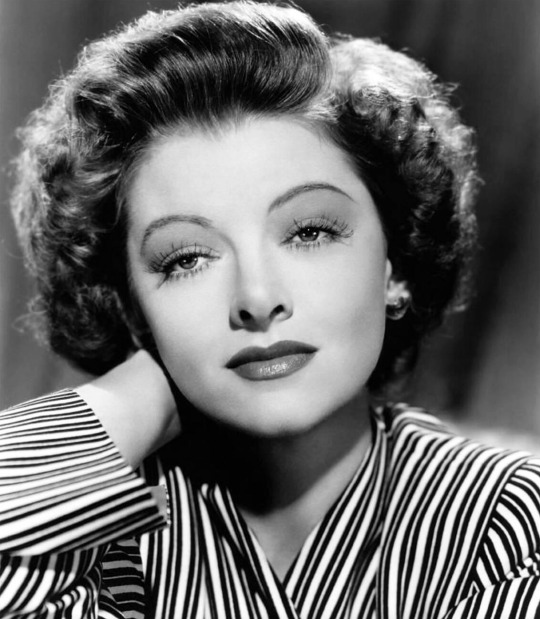
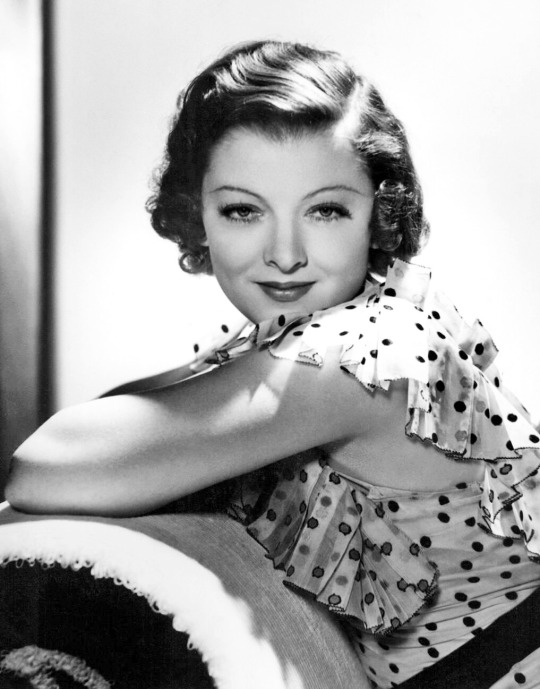
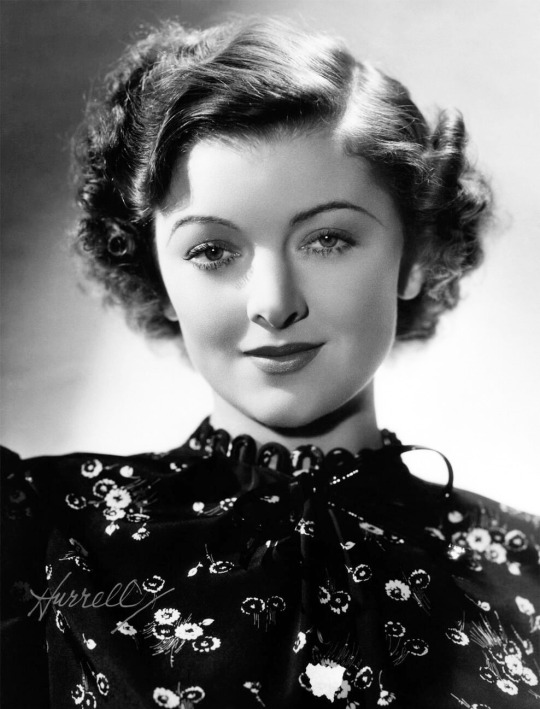
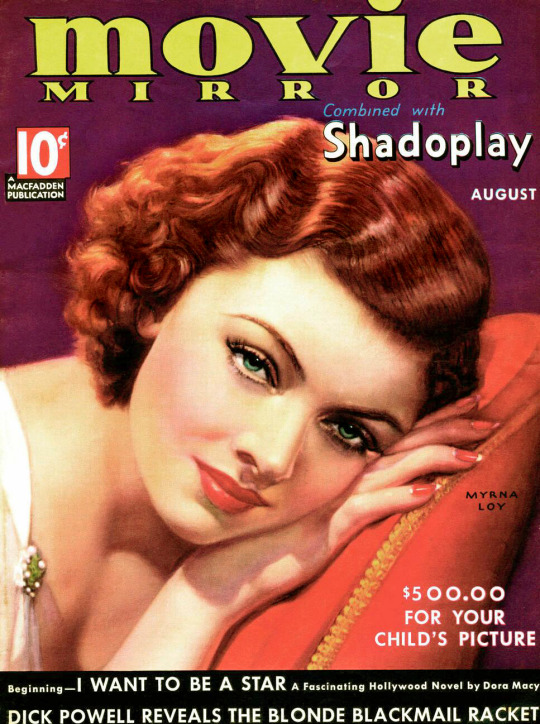
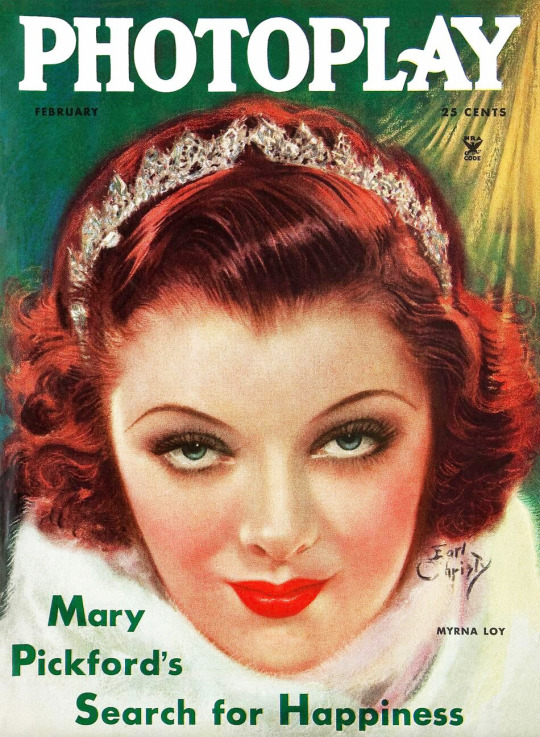
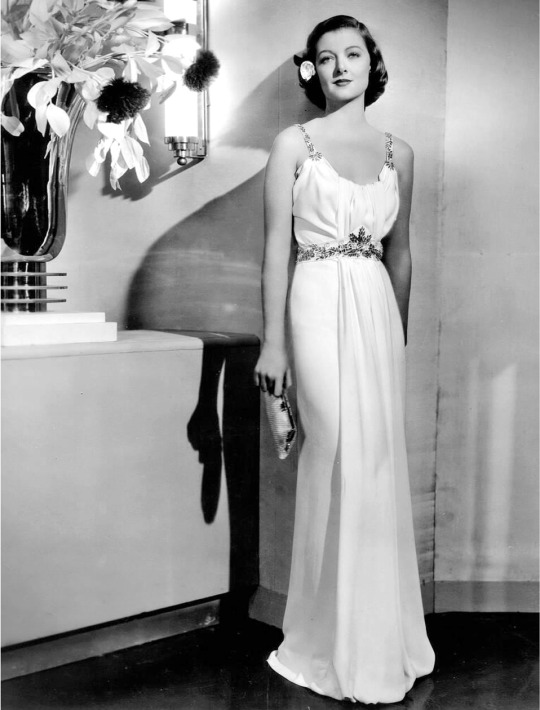
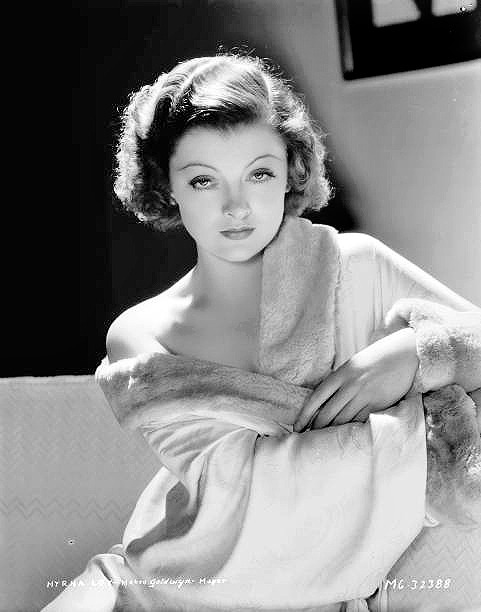
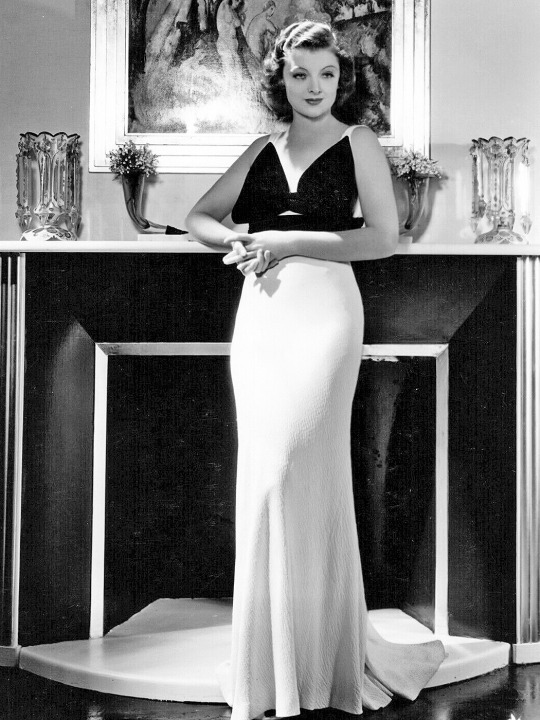
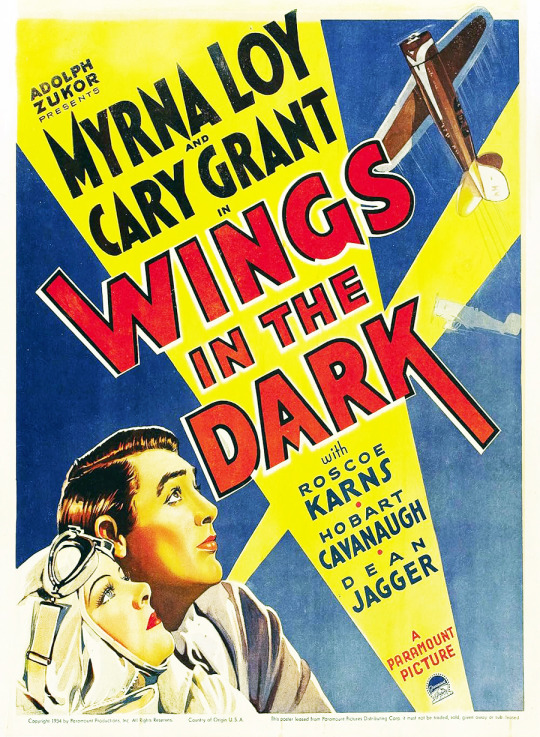
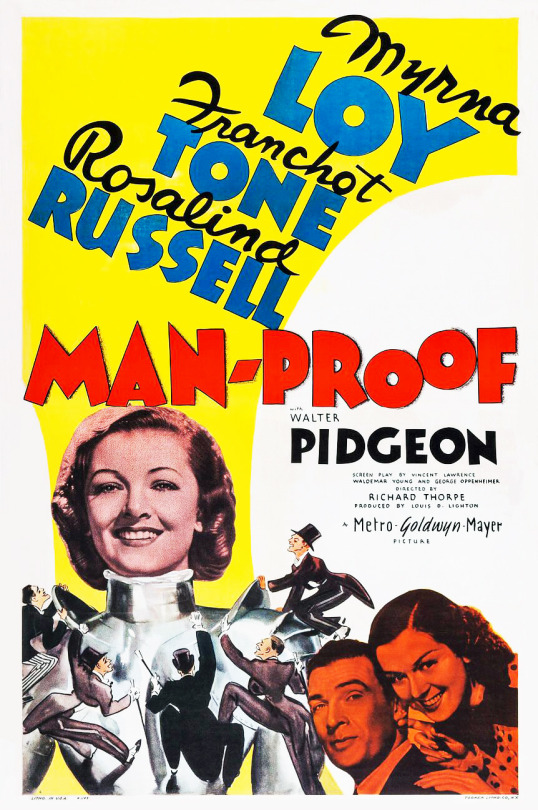


Myrna Loy (born Myrna Adele Williams in Helena, Montana on August 2, 1905 ) was an American actress who reigned as one of America’s leading movie stars in the 1930s and the 1940s. Millions of fans idolized her as ‘the perfect wife,’ a paragon of charm, sophistication and intelligence, earning her the title as "The Queen of Hollywood."
Of Welsh, Scottish, and Swedish ancestry, Loy moved to Culver City in her early teens. She first attended the exclusive Westlake School for Girls. When her teachers objected to her extracurricular participation in theater, her mother enrolled her in Venice High School.
To help the family, she wroked at Grauman's Egyptian Theatre, where she performed in prologues, musical sequences that served as preliminary entertainment before the feature film. This led to work as an extra in Hollywood productions in 1925 and then a contract with Warner Bros. in 1926.
With the advent of sound films, she then became associated with musicals, and when they began to lose popularity, her career slumped. In 1934, after Loy's move to MGM, John Dillinger was shot to death after leaving a screening of her film Manhattan Melodrama (1934). She received widespread publicity, with some newspapers reporting that she had been Dillinger's favorite actress.
Loy gained further fame from the box office hit, The Thin Man (1934), which spawned five sequels. This marked a turning point in her career, and she was cast in more important pictures and became one of Hollywood's busiest and highest-paid actresses,
With the outbreak of World War II, Loy focused on the war effort, becoming an active member of the Hollywood Chapter of 'Bundles for Bluejackets,' helping run a Naval Auxiliary Canteen, going on fundraising tours, and volunteering for the Red Cross.
In the coming decades, she continued acting alongside her activism work. She organized opposition to the House Unamerican Activities Committee in Hollywood through radio broadcasts and petitions, worked with the federal government, and served in UNESCO.
In 1975, Loy was diagnosed with breast cancer and underwent two mastectomies. She kept her diagnosis and subsequent treatment from the public. This resulted in her progressive retirement from acting; her last film performance was in 1980 and her last acting role on TV in 1982.
In failing health, Loy died at age 88 in a Manhattan hospital during surgery following a long, unspecified illness.
Legacy:
Received an Honorary Academy Award in 1991 in recognition of her life's work both onscreen and off
Bears the likeness of the 7-foot statue outside Venice High School, titled 'Inspiration," created in 1922 and has since become a symbol of the school and the community
Has a building named after her at Sony Pictures Studios, formerly MGM Studios, built in 1935
Named Queen of the Movies in a 1936 national poll by New York Daily News
Honored with a block in the forecourt of Grauman's Chinese Theatre in 1936
Listed by the Motion Picture Herald as one of America’s top-10 box office draws in 1937 and 1938
Served as the full-time assistant to the director of military and naval welfare for the Red Cross from 1941 to 1945
Became a member-at-large of the U.S. National Commission for UNESCO from 1949 to 1954, the first Hollywood celebrity to do so
Has been the namesake of Venice High School's annual speech and drama awards, the 'Myrnas' since 1953
Served as Co-Chair of the Advisory Council of the National Committee against Discrimination in Housing from 1961 to 1962
Became a founding board member of The American Place Theatre in 1963
Commemorated with a cast of her handprint and her signature in front of Theatre 80, on St. Mark's Place in New York City in 1971
Appeared in John Springer's "Legendary Ladies" series at The Town Hall in 1973
Presented with the 1979 Career Achievement Award by the National Board Review
Honored by the Los Angeles Film Critics Association Awards in 1983 with the Career Achievement Award
Published an autobiography, Myrna Loy: Being and Becoming, in 1987
Was the winner of the 1988 Kennedy Center Honors
Honored by the Steel Pole Bath Tub with a song on their 1991 album Tulip that is both named after Loy and samples dialogue from one her film, The Thin Man Goes Home (1945).
Named by The Guardian named her one of the best actors never to have received an Academy Award nomination in 1991
Has been the namesake for The Myrna Loy Center for the Performing and Media Arts in downtown Helena since 1991
Honored as Turner Classic Movies Star of the Month for December 2016
Has a song named after her in Josh Ritter's 2017 album Gathering
Has a star on the Hollywood Walk of Fame at 6685 Hollywood Blvd for motion picture
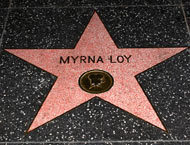
#Myrna Loy#The Queen of Hollywood#The Queen of Movies#Silent Films#Silent Era#Silent Film Stars#Golden Age of Hollywood#Classic Hollywood#Film Classics#Old Hollywood#Vintage Hollywood#Hollywood#Movie Star#Hollywood Walk of Fame#Walk of Fame#Movie Legends#hollywood legend#movie stars#1900s#28 Hollywood Legends Born in the 1900s
6 notes
·
View notes
Text
FAVS 16 CHARLES LECLERC 6.0
Some of my favorite stories, writers you are amazing
𝐀 𝐋𝐞𝐜𝐥𝐞𝐫𝐜 𝐀𝐝𝐝𝐢𝐭𝐢𝐨𝐧 pt 2 𝐏𝐭3 𝐬𝐮𝐦𝐦𝐞𝐫 𝐛𝐫𝐞𝐚𝐤 𝐟𝐞𝐞𝐥𝐢𝐧𝐠 heart eyes in a different timezone written on the books 𝐄𝐧𝐚𝐦𝐨𝐮𝐫𝐞𝐝 safe with me 𝐞𝐯𝐞𝐫𝐲𝐭𝐡𝐢𝐧𝐠 𝐞𝐧𝐝𝐬..𝐨𝐫 𝐝𝐨𝐞𝐬 𝐢𝐭? 𝐥𝐢𝐭𝐭𝐥𝐞 𝐛𝐚𝐛𝐲 𝐥𝐞𝐜𝐥𝐞𝐫𝐜 the ways in which Charles shows you he loves you this is me trying it's called love Charles Leclerc x horse rider reader Under the Influence 𝐂𝐡𝐫𝐢𝐬𝐭𝐦𝐚𝐬 𝐄𝐯𝐞 𝐓𝐫𝐚𝐝𝐢𝐭𝐢𝐨𝐧 (𝐥𝐢𝐭𝐭𝐥𝐞 𝐤𝐚𝐫𝐭𝐞𝐫 𝐚𝐮) 𝐋𝐞𝐜𝐥𝐞𝐫𝐜 𝐂𝐡𝐫𝐢𝐬𝐭𝐦𝐚𝐬 𝐄𝐯𝐞 stuff it vogue Not His Type my girl can ride "new years eve with the boys" all’s well that ends well Christmas will really be Christmas new man piano prince Ocean eyes couple back home angel baby, devil child miss americana and the heartbreak prince ferrari boys not a secret Domestic Bliss cruel joke melodrama maybe she's just a fan PR manager SPARKS FLY pt2 pt3 pt4 All because I like a boy Call it what you want "He Can't Know" "He Does Know" in my lover era! (social media au) GRADUATION + HATE + LOVE Protective girl summer love not hiding happy ever after drama queen god is a woman no way screw soft launching best moments sunshine into you world tour ferrari true temptation it's time to go is it cool that i said all that?
14 notes
·
View notes
Text
Todd Haynes on the Visual Style of Velvet Goldmine
OM: In writing the script, were you afraid that the strong visual style of the film would overwhelm the characters to the point of pushing them to the background and having the film be about its film-making?
TH: I think the film succeeds in exploring the way stylistic tropes and conventions of expression can be taken to an extreme point of self-conscious, ironic, highly theatrical, highly worked presentation without losing emotion - but I'm still not really sure how it works. And yet it's been the thing that I've been drawn to in all my films; Superstar is the best, cleanest example of that. And I completely agree with you that the doll scene in Velvet Goldmine - which is definitely a homage to myself (somebody's got to do it) - does represent the film as a whole, and maybe in the most complete way. A lot of it has to do with the game of laughing and feeling aware of the construct - in a fun way, not in a Brechtian, didactic way. There's humor in glam rock, there's irony and wit, and it's often about its own point of address; it's often about the presentation, the inherent artificiality of our so-called natural world. And yet it ends up being very moving with its rhythm, its meter, its color. And that's something I was going to try to do with this film.

What is so hard about narrative, and our current traditions - which don't even include the musical any longer - or the codified, highly stylized pop culture of the past, is how to avoid the Hollywood gloss - which only gets glossier as budgets soar - as well as the indie gritty "realism" we accept today. So directing this film was all about taking it to a new stylized, self-conscious, artificial extreme, without losing the good old-fashioned emotional connection to the characters. It was the hardest thing about the project, but it was the one thing I demanded from myself throughout the process.
What I really found dangerous about the many aesthetic styles and stylistic choices was the risk of alienating the characters by removing a naturalistic definition from scenes. And yet I find the "Press Soiree" - the scene where everyone's in the gold costumes, which culminates in some strange circus/opera house - is rooted in a more "real" space. And the irony is that this artifice, this scene, comes from something that really happened, that was pushed about as far into the surreal as you could possibly imagine. The scene came from the time when the MainMan management company assembled itself in London, flying over a handful of US critics to introduce the Ziggy Stardust tour. I think it was at the Dorchester Hotel in London where Bowie, Lou Reed and Iggy Pop posed all day long. Bowie changed costumes maybe four times, they served champagne and caviar and fresh strawberries, and everyone literally performed themselves: Iggy played the junky on the floor; Lou Reed played the snide American who is smitten with Bowie; and Bowie played the duchess of the entire event. It was a completely constructed theatrical performance that took place in real life, and so it didn't take that much more imagination on my part to push it to the extremes I did in the film. I kept defining the characters all the time so they wouldn't get lost in the grandeur of it all.
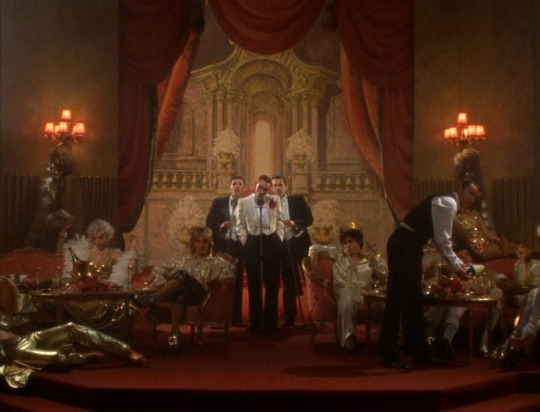
OM: That grandeur, the visual language of the film, is incredibly rich and textured. You use what seems to be a huge arsenal of visual tools. Your cinematic vocabulary (zoom-ins and outs, swish pans, fades, dissolves, superimposition, rack focus, etc.), your use of color (saturated, glittering, bleached, faded, etc.), the use of different genre conventions (the biopic, promo film, documentary, melodrama, musical, period piece, mystery, etc.), and your many choices of lighting styles and camera angles, among other things, create a wonderful sense of serious fun.
TH: A lot of those stylistic decisions came out of a focus on the way film-making styles have changed over the last thirty years. I looked at how so many of the visual motifs in those youth experience movies I mentioned before [like 2001, Clockwork Orange, and Nicolas Roeg's Performance] as well as in some of the best movies of the early seventies - Robert Altman's work, Coppola's and others - have disappeared from our canvases. At that time there was a climate of experimentation with lenses and zooms: they preferred long lenses as opposed to wide lenses. It literally led to an appreciation of the grain of cinema - what isn't completely clear and completely available to an objective assessment. So I wanted to get back to that. I also had a nasty desire to break rules that were deemed tacky, to reintroduce all the potentially hokey devices that have gone out of style. I wanted all that fun stuff to become commonplace in the overall style of the film and then for it to be highly sutured with music, voice-over, and fractions of narrative.
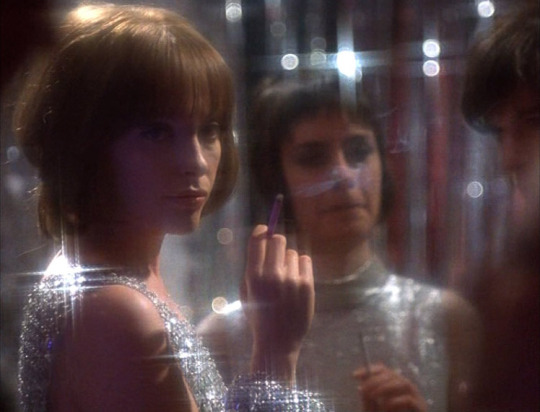
OM: I know you put together a big scrapbook to define the look of Safe. Did you do the same with Velvet Goldmine?
TH: Yes. Three scrapbooks, actually. Big ones. It really is part of my way of working as a film-maker. Because glam was such a visual application of rock, the clothes, the hair, the make-up - both on and off stage - were going to be an essential part of how to imagine the collage of looks for this film. The scrapbooks helped inform me how the film would be shot, how it would be designed, costumed, color-coded, etc. I put together pure images of the bands and album covers, from the most throw-away backstage snap shots to the most theatrical Roxy Music cover. I wanted to have it all in one place, to have a great source of information for everybody. We pulled out those books at every stage, from casting to costume design to make-up and hair. They were really an essential part of the process from the script stage on.*
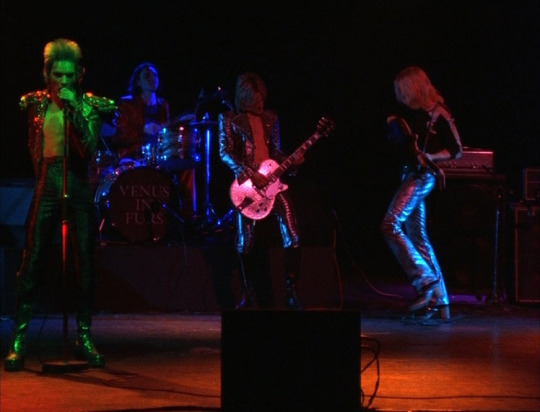
OM: Each scene is very specific, and I remember when you came back from London the first thing you told me was that you shot the script, which is quite an accomplishment.
TH: It's funny because I never write the script just for myself, even though it may read like it sometimes. I try to explain with the script as meticulously as possible - and it does sometimes verge on the insanely meticulous - exactly what I am seeing in my head and hearing in my ears - which includes every minute description of the score in the very first draft of the script, and all the fades and optical effects. To me, film is about all of its elements together; it's not about some piece of truth that I'm immortalizing on celluloid and which later I can finesse with clever little tools. It's all constructed! It's all working together to present to you, the reader, something that is an experience as well as a blueprint. That's where my scripts go overboard. And they often require more technical discussion than other scripts because I am paying attention to such specific details at an early stage. I don't really know how to write a screenplay without acknowledging all the elements of film-making I want to use... In a way it's impractical; I admire the simplicity of directors who can say, "At this stage, we just need to know the dialogue and the location." In most films that's enough; it gives you enough sense of the rhythm, pace, the overall body of it. But my scripts are always loaded with excessive descriptions of music and subtleties that you may never even perceive when you're watching the film but that I choose to put in the writing. I have to go completely sensory in my descriptions, as if I'm describing, in semi-technical language, a film I am watching.
OM: It probably has something to do with your need to control the medium when you direct. You also storyboard every film you make from beginning to end, which is completely unusual. Why do you insist on sketching every shot?
TH: What can I tell you? I'm a control freak. But I have my reasons. I think most people who work in film - technicians and directors alike - agree that the clearest way to describe what you're seeing in your head is to have a sketch of it... If you have something very specific in mind, which I usually do, you have to be able to show it... [If] I don't feel I see the scene, I feel like it hasn't been written. And if I do see the scene in my head - which ultimately I must in order to direct it - I'm going to show it on the storyboard. I have to make it visual.
Velvet Goldmine has so many scenes that are indescribable in terms of visual reality. Take the scene where the character of Devine is introduced, with that line of executives sitting at a long table. Both Maryse [Alberti], the DP, and Christopher Hobbes, the designer, were very patient with me as I got closer and closer to being able to make this imaginary space concrete. It was supposed to be an empty, strange space - possibly a big studio room - but, for the most part, I wanted it to be defined by the lighting and by this absurdly large conference table that would be tilted and floating in space. That's a scene I'm particularly proud of because all of the angles, the lighting, the costumes work so well together that there is this assumption that we know exactly where we are. All the elements come together but it starts with a clear understanding among the crew of what every shot is going to look like.

Source - "Superstardust: Talking Glam with Todd Haynes", Oren Moverman
Edits and highlights my own :)
*Bonus: For anyone in/near New York City, there will be a Todd Haynes retrospective and exhibit at the Museum of the Moving Image starting this November. It'll include his production archive, which means there might be a chance to see the Velvet Goldmine scrapbooks in person!
#this interview is the gift that keeps on giving. so much interesting stuff!#25yearsofvelvetgoldmine#velvetgoldmine25th#velvet goldmine#SO excited for the Todd Haynes retrospective - I'll have to get myself uptown to the MoMI for the first time#and the retrospective means ANOTHER chance to see VG on the big screen!
11 notes
·
View notes
Text

Cress Meadowforge (she/her). Trainer. District One. Twenty-five. Anya Taylor-Joy. UPDATED BIO.
TWs: sexual assault, drugs/addiction, forced medical procedures, burn mentions, violence
Cress is a Queen of the Night. More aptly, a night-blooming cereus: a cacti flower that only blooms once a year, for a single night. For most of the year, she remains tightly coiled, spikes bristled for any who might venture too close. No amount of tending to can coax her from her shell, from the armor she has built to protect herself from the world outside. And then, in the most unlikely moment, when all the world lets down its guard, she blossoms.
A rare few will see this - see her - but that is all it takes.
Born to wealthy jewelers Fleur and Myron Meadowforge in the heart of District One, Cressida understood that certain heirlooms held invaluable merit, regardless of their beauty. It was the artistry and craftsmanship that mattered. She viewed the Games in much the same way: a wretched masterpiece without compare. She watched each one in horrid appreciation, the way someone admires the truly macabre, knowing that one day, she would have the honor of bearing this beautiful burden too.
And when she did, she realized there was nothing beautiful about it.
Cressida volunteered for the 120th Hunger Games, her eyes bright and hungry. She had trained for this for years beside the other Careers, all sharpening their teeth against the others, smiling cruelly the way an animal warned its prey the end was near. Her skills were her charm, her air of innocence, and her beauty – at least, that’s what her mentors instructed her to portray. They painted her as something desirable and riveting to sponsors and a sincere ally and advocate to the other tributes, and it was a spotless, hollow facade.
They’d called it Clima Cladis – the climate of disaster – and Cressida remembered thinking that she wouldn’t have to kill anyone, that doing so would actually be a mercy compared to what the environment was doing to them. It’s the seasons, the commenters had gasped, and they had been close. It had been the seasons, but not like she’d ever known: summer so hot it seared and melted flesh from the bone; winter so cold that, had they survived, it would have been without noses, or fingers, or toes; and spring, with its torrential downpour that flooded the arena and mutts that emerged from hibernation ravenous and cruel. Only the fall had been a reprieve, and they craved it each rapid cycle – emerging from their hiding places in search of supplies, and sustenance, and sponsorships.
She won by killing the entirety of the Career pack first, framing another district for the slaughter before positioning herself as a helpless fawn in need of companionship – a sheep who had been forced along with the wolves. One by one, Cressida won the others’ favor – their trust and affection – until they lost their lives to her hand in turn. The pair from Eight. They took her poison willingly, thinking it was medicine. The boy from Six, who held her down in the burning sun. She broke his legs, let him fry in the summer heat, listened to his screams from the mouth of a cave. In the end, Cressida didn’t even have to kill the last tribute: Lila. She – under the impression that they were in love – killed herself to let Cressida win, throwing herself from the top of the mountain that they had been forced up in the finale. She secured her place in arena history as having one of the highest kill counts out of any victors. Cressida’s Games were heralded not as one of startling might or breath-taking violence, but of operatic melodrama – of unparalleled manipulation and cunning.
Cressida had dazzled Panem in the arena, but she found the price of victorhood immeasurably steep. The Head Gamemaker, Eugene Pharmakos, found her astonishing, a cunning creature of unparalleled beauty. She was invited to meet him the night before her victory tour – an encounter that irreparably altered her life. Despite the efforts of her mentors, Domitia and Dahlia, Cressida was commodified for Capitolite consumption. Drugged with morphling and sleeping syrup, she spent her victory tour in a stupor, given uppers to keep her cognizant enough to perform at each designated stop. Exploited for the amusement and entertainment of the elite, Cressida realized that she was now District One’s finest luxury export. She was eighteen.
The life of a victor further dehumanized her, stripping her of agency she had fought – and won – to reclaim. Had she not done as they asked? Was she not entitled now to a life of spoils – of peace, at least? Scarred on nearly a fourth of her body, Cressida begged the Capitol to heal her, to graft her skin and remove the burn marks. They agreed, put her under, sent her into surgery. But the Capitol saw the scars as salacious, desirable in their morbidity – the price of victorhood. One Cressida couldn’t afford to override. Instead, she was given cosmetic surgery. Her buccal fat removed, her facial symmetry increased, her lips injected with fillers, her body altered. When she awoke, Cressida wept for a week.
Still, it was easy to feign contentedness under such a continued stupor, still weaning her way off of the sleeping syrup and morphling. She knew already how to behave, so much so that she began to exist as though automated: to angle the right way, to recite her words carefully, to enrapture and entice. Nothing about Cressida felt real anymore, and while she’d never been angrier or more miserable, she’d also never been more popular.
When given the chance, Cressida returned to the Tower as quickly as possible, eager for a task that allowed her to channel her rage. She took up training, committed to giving tributes a chance beyond their perceived or initial physical capabilities. She held no allegiance to a particular district; her politics defied regional boundary-lines, and her willingness to sidestep ethical boundaries made her an ideal saboteur with intimate access to tributes, mentors, and sponsors alike. Another Gamemaker, Lex Sterling, saw promise in this, and Cressida once again had a purpose.
Shedding her expensive skin, she left her old self behind – that angry girl from One, so vulnerable – and crafted Cress instead. Cress was composed. Cress was unshakeable. Cress did whatever she wanted. Cress existed only to indulge: to have, and to command, and to destroy. She began spying for Lex, and in turn, he offered his protection and his assistance in her pursuit of revenge against all those that had harmed her, including Head Gamemaker Pharmakos. Cress made things happen, or made things go away – it didn’t matter. It was all the same. She was biding her time. Building connections. Indebting. For years, it carried on this way, and Cress distanced herself from the before. Now and then were lifetimes away.
At times, she became so far removed from the past that Cress considered herself less a victor of One and more a victor of District Zero, a secret society and social club run in the catacombs beneath the Capitol, fueled by the same hyper-advanced technology and medicine that was used in the arenas. Here, she could operate within a familiar landscape, only now, with greater agency. Here, she could chase a high on her own accord, partial to the shimmering purple of ether. Here, she could explore the macabre in peace. Cress was a starlet of the upper-class elite, an heiress to the diamond mines owned by her family, and now the patron saint of the Capitol's underground social scene. At last, she had everything she ever wanted.
Until Cress met Slate Skylar during the 132nd Games and realized that – perhaps – there was more in the world than she ever bargained for. The pair began as sparring partners, training together in the Tower each night during the Games cycle. However, one evening, after Slate failed to show, Cress found him on the Twelfth Floor, surrounded by anti-Capitol propaganda: his rebel zine, TH3 T0MMYKN0CK3R. But Cress, despite her pro-Games perspective and her societal standing, was intrigued, drawn to the truth of Panem, desperate to understand the world beyond what they were shown on TV screens. With a shifting perspective, Cress found herself at Slate’s side: training, bantering, working on the zine. Perhaps it was inevitable. Only a boy raised in ashes could love something burnt. But Cress and Slate – two feral creatures, afraid of being trapped, suspicious of the world – found each other, and for once, the world did not hurt.
It was too good to be true. Too good to last. And a year later, during the off-cycle following the 133rd Victor’s Ball, Cress received a tip from Lex: Peacekeepers were coming to raid the apartment she and Slate shared. They were coming to arrest him. Cress and Slate attempted to burn the evidence, turning the complex into an inferno. But as Cress slipped through the window onto the fire escape, Slate locked it behind her. She watched as he turned back, continuing to shovel items into the blaze. She watched as the Peacekeepers arrested him, dragging him away. Cress was transported to a safe house on the outskirts of the city, where she was treated for smoke inhalation and her burn wounds while she and Lex worked to clear her name.
It was also where she took a test, alone, sitting on the floor of the bathroom. One that came back positive. Cress was pregnant. Her whole world had changed overnight.
Eventually, when Slate resurfaced in a Capitol prison, she was able to leverage her connections to curate a brief goodbye. During the visit, grasping each other between metal bars, Cress broke the news. He told her to choose for herself, to keep it or not. Slate was to be executed. It was no longer his to help decide. He would never know the child, never be more than a story Cress and Hestia told. The Peacekeeper said time was up. Cress wanted to die.
She went to Twelve, where she stayed with Hestia Ember. Under her protection and guidance, Cress learned how to care for the child she would bring into this world alone. They waited for months for word on Slate’s execution, his fate left undecided, dragging on – painfully – further and further. When it was time for Reaping Day, Cress returned home to One. She was still a victor, still eligible. It was her duty to stand on stage and look strong, proud. But as she walked to the Reaping stage, Cress’ phone buzzed with a news notification: Slate, the infamous rebel also known as Meta Morphic, had been Reaped as a tribute from Twelve. She stumbled out onto the stage, stunned, only to hear a familiar voice ring out. Her youngest sister, Callisto, with her hand held high in the crowd. I volunteer. Once again, in an instant, Cress’ world came crashing down.
Strengths: charming, eloquent, strategic, clever, warm
Weaknesses: manipulative, vengeful, materialistic, hedonistic
PENNED BY: LENA
3 notes
·
View notes
Text
Oh guys btw I'm back writing my bad fnaf fanfiction. If you like plots that are super convoluted with soap opera levels of melodrama and one running gag that gets less funny every time it's shown, you'll like Fnaf World Tour.
It currently has 40+ chapters and I update it sporadically, in bursts of several at a time with long hiatus in between. As far as how long it has until it's done... well, I have an arc for nearly every character I've shown and I plan to keep playing with them until everyone has gotten through their issues and either lives happily ever after or dies in a fire, so... this thing may be eternal. If that's your cup of tea, give it a read lol.
2 notes
·
View notes
Note
I need your help deciding what Duncney fanfiction I'm gonna write
-AU in which World Tour was scripted and there's a whole lot of melodrama where technically Courtney and Duncan are together the whole time but they get increasingly possessive.
-Fanfiction in which Duncan reads a ton of stuff psychoanalyzing his relationships and (poorly) tries to fix things with Courtney according to what stupid internet users think is correct.
-AU in which Duncan does a crime, and Courtney is the lawyer of the person trying to sue him. They fall in love, and Courtney has to decide whether or not to sabotage her own client.
-My own personal viewing of Courtney's life and backstory up to and during the show that makes everything SO MUCH WORSE and adds all of my trauma to her. (Would be really heavy.)
Why not all of them? 👀
These would all be extremely interesting to read! I am gravitating towards the lawyer one. The reality of that situation would be so bad but in fanfiction it’s fun! I think it’d be really funny too.
11 notes
·
View notes
Text
We Told You This Was Melodrama
so Melodrama is 6. what a timeless album it has been. i find myself come back to Melodrama regardless of what was going on in my life the last 6 years. as it should be.
and listening to Melodrama almost exclusively after my first heartbreak. for 3 whole months. i lived and breathed Melodrama so much that it had to be one of the first few tattoos on me.
(if i accidentally passed in a natural disaster in another country, at least they have the Melodrama tattoo to identify me)
the Melodrama era was so fucking magical. the tour. the songs. the lights. the concert confetti. the outfits. the interviews. the social media engagement. the music videos. the photoshoot. god the fucking pictures and fucking photoshoots. (LOL the one where lorde's above water and looking directly into the camera - currently my icon on outlook. STILL. i changed it back in 2017 probably. and it was my main tumblr's avatar for a while. and glamourtraumamelodrama was my main tumblr's url for a while)
and to Melodrama i danced and i sang and i yelled and i cried and i bawled and i choked and i froze and i felt like i was on top of the world and i grieved and i accepted things and i ran and i sat alone and smoked so many cigarettes to it on so many nights and i drove down so many streets and highways and i sang on top of my lungs when i was in love and i loved it enough to get a tattoo of.
at various points of my life the last 6 years, i've never shut up about Melodrama and it was the one thing people knew about me. as it should be. Melodrama deserves all the hype it deserves.
a masterpiece isn't even good enough to describe Melodrama. neither is a cultural phenomenon. it's obviously more than that. and of course it means different things for every one. and for me - it's a tribute to my late adolescence, a sense-making navigation guide of my early/mid/late 20s, and everything in between. i was in love. i was in many foreign places. i got my heart broken (again and again). i made friends. i lost friends. i was in so many depressive episodes. amidst everything that changes so quickly, Melodrama was, and still is, the one companion that feels like home. i guess when you get your heart broken again and again, at least you feel less alone when you have a companion while you put yourself back together. again and again. you're not a liability. whoever makes you feel so is welcome to fuck off and die. as they should be.
Melodrama is still as magical as the first time i listened to it. regardless of whether i'm leaving it in the background, or really listened to it. well, listening to Melodrama at an older age feels more magical because i've got more life experiences to project and feel. but you get what i mean. i'm not skilled enough with my words and thought processes to talk about the production and the words. it just feels so... well-thought.
there will never be another album like Melodrama, and i'm okay with that. it is experimental enough yet there is some form of consistency that ties every track together. you could play the album on loop, listen to it from start to end, and let it start again. it still flows. both the grandeur and stripped-down production has its place, and lets you feel what you need to feel.
close your eyes and feel everything. it's a trip you take down your brain and at the end of the lane there is catharsis.
what a time to be alive at the same time Melodrama exists. (thank you Lorde) it makes all the other sufferings a little more bearable. and i guess that's enough for me for now. i might change my mind but whatfuckingever. i change my mind all the time anyway.
what a fucking time to be alive. to have an album of my generation that i could call my own in my 20s. that would be talked about for decades to come. an icon that i have to hold on to as i get older (assuming i live till then.)
all i wish for is that i could take some molly and listen to Melodrama while i'm on it. like Lorde did when she made this album. as it should be.
one can dream
i guess. through it all. in life there's only 3 things that matter:
the glamour
the trauma
the melodrama
Melodrama Forever xx
3 notes
·
View notes
Text

Featuring in our Summer 2023 issue, Maisie Peters discusses the magic of music, the power of vulnerability, and her spell-casting sophomore album, The Good Witch.
“I really believe in the magic and the power of music. Songs can often feel like spells,” beams singer-songwriter Maisie Peters. Back in London for just a few days, sandwiched between tour dates, the artist is contemplating her upcoming sophomore studio album, The Good Witch, on the set of her Wonderland shoot. With nods to fantastical childhood tales and references to witch hunts, the 23-year-old blends the line between fact and fiction, creating an honest and mystical space between.
At its core, the album is a coming-of-age story, a brilliant description of the dizzying reality of the twenty-something years. Love, happiness, heartbreak, devastation, confusion, and anger: those all-encompassing emotions that feel larger than life during the primary throes of adulthood weave in and out of the tracklist. But while these themes are present throughout, Peters assures me that she was seeking refuge from their complex grip whilst penning these tracks. “If I felt out of control in my personal life, this album was my little universe where I could say and do what I wanted to and make characters say and do what I wanted from them.”
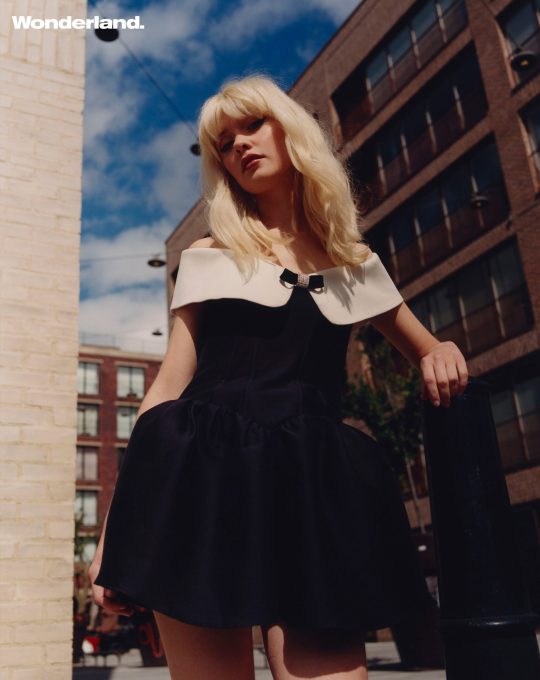

If her debut, You Signed Up For This, served as a snapshot of the adolescent experience and a farewell to her teen years, The Good Witch was expectedly the start of a new age. Take first single “Body Better” as an example. A deeply personal cut, it captures the insecurities that surface after a sudden end to a relationship — the torturous ruminating whilst trying to understand why it didn’t work out. “I wanted to begin with “Body Better” because I wanted to start with a real intent,” she explains. “I’m serious about music and I want to be an artist with longevity. I think to do that, you have to be prepared to sacrifice — you have to be vulnerable, you have to open up and give something of yourself.”
When it comes to songwriting, it’s easy to see how seriously Peters takes her craft. Attention to detail is rife as she spins literary references and mythology into early 2000s pop-esque power and a decade-defining tone akin to Lorde’s Melodrama. “Because I write pop music, I’m looking to say something concisely,” she lets on. “I want people to understand what I’m saying.” And it is safe to say she has achieved what she set out to do. Putting the most complicated emotions into direct terms, she creates music that resonates with the 20-somethings of today.
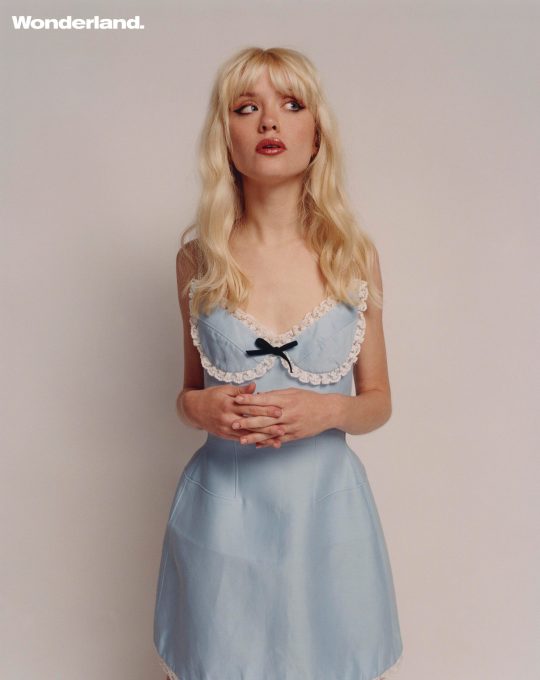

It’s hard to pick a standout track from The Good Witch, but Peters’ own personal favourite is a good place to start. A beautiful ode to her on-stage team, “The Band And I” details their experience touring around the United States in a bus, playing live shows, and meeting the fans. “It’s a song you only really write once. It embodies this huge part of my life and it’s so special to be able to sing about that every night on tour.” There is also the title track, which explodes into a compilation of voice notes from Peters’ closest friends and cheers from her Webster Hall show. However, “Coming Of Age” is one of the most poignant of the album, reminding us that we hold power over our own narratives. “It’s a very easy thing to do to give so much magic to somebody else. And I’m a songwriter, so I’ll have my muses and think they’re God’s gift to the world,” she laughs. “It can be beautiful, but why have we given them so much power? Take it back! Give it to yourself. Recast the film.”
It is clear that Peters fights the battles she faces with her craft. “If you sing about something enough, it begins to work its way into what’s really happening,” she says. As true as this may be, I am left assured that Peters’ success is more than manifestation. It is pure magic.
2 notes
·
View notes